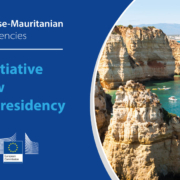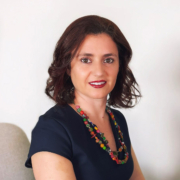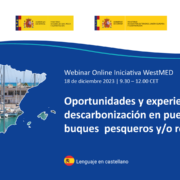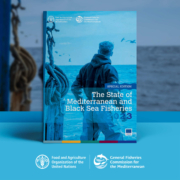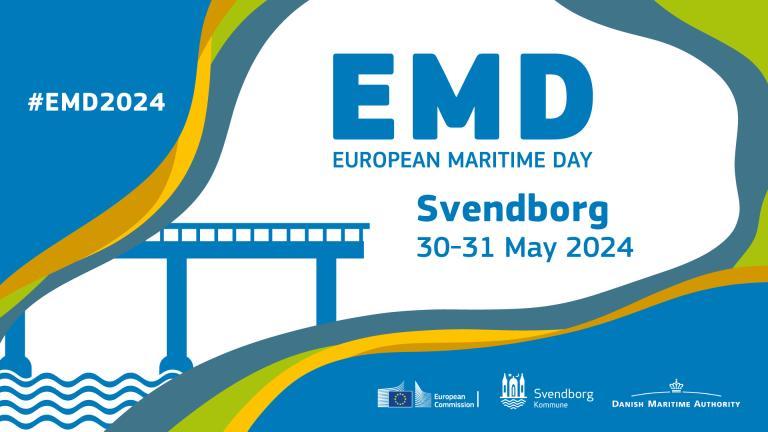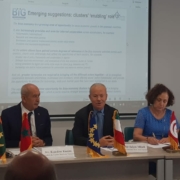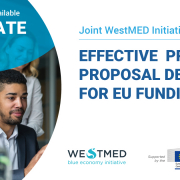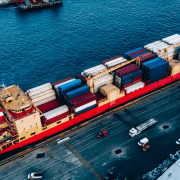En inglés, haga clic aquí | Vea el seminario web a continuación o en YouTube
El 18 de diciembre de 2023, el Hub Nacional España de WestMED acogió un webinar titulado “Oportunidades y experiencias de descarbonización en puertos y buques pesqueros y/o recreativos“.
El encuentro, organizado en colaboración con el Ministerio de Agricultura, Pesca y Alimentación y el Ministerio de Asuntos Exteriores, Unión Europea y Cooperación, reunió a 97 participantes con representantes de autoridades (regionales, nacionales), empresas, PYMEs, ONGs, científicos, clusters, asociaciones pesqueras, GALPs y universidades (lista de participantes)
Objetivos principales
El webinar apoya el esfuerzo para descarbonizar el sector de la pesca y la náutica de recreo en el Mediterráneo Occidental y ayudar a alcanzar los objetivos del Pacto Verde Europeo, incluyendo la reducción de las emisiones de GEI, teniendo en cuenta al mismo tiempo la rentabilidad, la sostenibilidad y la resiliencia de estos sectores.
Los principales objetivos del Webinar fueron:
- Dar a conocer la Iniciativa WestMED y su Mecanismo de Asistencia.
- Debatir sobre las oportunidades y desafíos que la descarbonización plantea para los puertos y embarcaciones recreativas y pesqueras
- Aportar la perspectiva de la pesca y de la industria de la navegación de recreo (perspectivas de puertos y embarcaciones) ante los retos de la descarbonización
- Debatir sobre posibles fuentes de energía, soluciones tecnológicas, marcos regulatorios y oportunidades y desafíos generales para avanzar hacia los esfuerzos de descarbonización
- Dar a conocer los esfuerzos realizados por el Ministerio de Agricultura, Pesca y Alimentación
- Dar a conocer los esfuerzos realizados por la Dirección General de la Marina Mercante y del Ministerio de Transportes y Movilidad Sostenible
- Interactuar con los agentes más relevantes a nivel nacional en materia de descarbonización de puertos y embarcaciones recreativas y pesqueras
Bienvenida/ Apertura
Jose Maria Solano, representante nacional de la Iniciativa WestMED del Ministerio Agricultura, Pesca y Alimentación destacó los esfuerzos de descarbonización que se están realizando en España, tanto en la vertiente atlántica como en la mediterránea, donde hoy por hoy no existe aún una tecnología viable de cero emisiones que permita una descarbonización total de la flota pesquera y/o recreativa.
Objetivos y contexto de la descarbonización en el Mediterráneo Occidental
Marta Pascual, hub nacional español de la Iniciativa WestMED, explicó las oportunidades de financiación europea y de colaboración a través de proyectos europeos con el soporte de la Iniciativa WestMED y, más concretamente, bajo la asesoría del mecanismo de asistencia. Marta explicó que los resultados y materiales del webinar se enviarían al Energy Transition Partnership (ETP) para que pudiesen tenerlas en cuenta en la hoja de ruta que están desarrollando para el 2024.
(ver presentación)
Posición Española respecto a la descarbonización de la flota pesquera4.
Sr. Francisco Manuel Fernández Martínez, subdirector adjunto de la secretaría general de pesca del Ministerio de Agricultura, Pesca y Alimentación trasladó la posición española respecto a la transición energética de la flota pesquera.
(ver presentación)
El Sr. Fernández Martínez explicó la comunicación de la comisión sobre la transición energética en el sector pesquero y de la acuicultura (21 de Febrero 2023), resaltó cual es el estado y la tipología de la flota pesquera española y reflexionó sobre cuáles son los 3 retos a los que se enfrenta el sector pesquero para poder llevar a cabo la descarbonización: las barreras tecnológicas, las barreras de conocimiento y legislativas y las barreras financieras. Entre las 4 principales áreas de actuación tenemos: 1) Mejora del marco de gobernanza y de cooperación / coordinación entre los diferentes actores implicados; 2) Superar las lagunas tecnológicas y de conocimiento existentes a través de la I&D; 3) Mejorar el entorno de negocio de la actividad, incluyendo las relativas a las oportunidades financieras; 4) Mano de obra formada y preparada en las nuevas habilidades que serán necesarias en la Transición Energética.
Descarbonización y sostenibilidad de la industria náutica
El Sr. Jordi Carrasco, director general de la Asociación Nacional de Empresas Náuticas – ANEN, comentó que el sector de la náutica de recreo es muy heterogéneo (puertos deportivos, astilleros, industria auxiliar, alquiler, etc.) pero que ya está trabajando la sostenibilidad desde un enfoque global: Avanzando en los motores con la disminución de sus emisiones, controlando la contaminación, impulsando embarcaciones eléctricas y de propulsión solar, con nuevos métodos de construcción que trabajan en la descarbonización de todo el ciclo de vida de la náutica de recreo.
El Sr. Carrasco comentó los resultados del Informe Ricardo el cual fue encargado a Ricardo plc por ICOMIA – International Council of Marine Industry Associations. Dicho informe destaca que el sector náutico representa menos del 0,1% de las emisiones totales de gases de efecto invernadero y se centra en las tecnologías de propulsión en embarcaciones de recreo de menos de 24 metros de eslora (5 sistemas de propulsión y almacenamiento de energía y 9 categorías de embarcaciones). La conclusión del informe es que no hay una solución única para reducir las emisiones de gases de efecto invernadero en la propulsión de embarcaciones de recreo y que nos debemos centrar en entender el tipo de uso de la embarcación para poder sugerir diferentes sistemas de propulsión. También se comentó que el impacto de las propulsiones alternativas en los precios de las embarcaciones de recreo del futuro aumentará previsiblemente entre el 5% y el 250%, según la tecnología utilizada. Es por ello por lo que se urge a realizar un análisis del ciclo de vida del sector con una visión integral desde el diseño y la fabricación hasta el final de la vida útil de las embarcaciones.
La descarbonización en buques pesqueros
A continuación, Miguel J. Núñez Sánchez, consejero de Transportes de la Representación Permanente de España ante la UE presentó las oportunidades y experiencias de descarbonización en buques pesqueros (pesca industrial) teniendo en cuenta la gran diferencia que existe entre buques mercantes y pesqueros ya que es un sector al que la legislación que le aplica es menor (Convenio MARPOL). Además de esto, la sostenibilidad se busca en todo el ciclo de vida, tanto en la parte de producción (pesca y cadena de transporte) como en el análisis de ciclo de vida de las embarcaciones. Sin embargo, los análisis y regulación de las emisiones en la cadena de transporte no se van a aplicar a los buques de pesca.
El Sr. Núñez también comentó las dificultades de los buques pesqueros para obtener un índice de eficiencia. Esto supone que en los barcos de pesca se hayan de generar índices de eficiencia propios que midan la mejor en la eficiencia energética en motores, calor residual, menores potencias, usos de iluminación de bajo consumo, mejor gestión del frio etc. (diferente del FuelEU Marítimo o del índice Count Emissions).
(ver presentación)
Presentación proyectos: “Estudio de la implementación de motores eléctricos en las embarcaciones de l’Albufera” y “Construcción barca piloto de l’Albufera”
Amparo Aleixandre Puchades, Gerente del GALP de Gandía Albufera presentó dos proyectos: “Estudio de la implementación de motores eléctricos en las embarcaciones de l’Albufera” y “Construcción barca piloto de l’Albufera”.
El estudio consistía en un análisis medioambiental, económico y energético y determinó y categorizó el uso y movimientos de los barcos en l’Albufera para saber cuál/es de estas embarcaciones podrían pasar de tener motores de combustión a motores eléctricos. El estudio dio lugar a una prueba piloto de un barco en l’Albufera que actualmente está en uso
(ver presentación)
Perspectivas empresariales: Torqeedo GmbH/ Proyecto CASTALIA
En la parte final del evento se dio paso a 2 empresas para que pudiesen dar su perspectiva empresarial dentro de la descarbonización y pudiesen enseñar sus soluciones de adaptación.
Carlos Martínez, Manager Iberia & Sudamérica de Torqueedo GmbH presentó sus opciones de propulsión eléctrica avanzada en agua ya que son pioneros y líderes en el mercado de la náutica de recreo. Carlos nos explicó para qué sirve la propulsión eléctrica (puro eléctrico) y para que no. No sirve para grandes esloras que quieran moverse rápido, sirve para distancias cortas y embarcaciones de 10-12m. Si miramos al ciclo de vida, las baterías contaminan y es por ello por lo que hay que mirar a la solución, pero también a su uso.
A continuación, Ramón Zubiaga de Consulmar y Samuel Gómez del Astillero SYM NAVAL presentaron sus servicios portuarios y el proyecto CASTALIA, embarcación 100% eléctrica de cero emisiones y multipropósito.
(Presentación Torqeedo)
(Presentación proyecto Castallia: folleto SYM Blue | vídeo)
Conclusiones principales del webinar
- No hay una solución única o universal
- Los combustibles alternativos son una solución de gran potencial para descarbonizar la flota recreativa actual
- Es necesario encontrar las mejores soluciones para cada tipo de flota para llevar a cabo la transición energética
- La transición energética debe estar acompañada de los fondos necesarios para la renovación de la flota para construir barcos que puedan incorporar las tecnologías de cero emisiones cuando estas están disponibles
- Es necesario revisar los conceptos de la Política Pesquera Común para que la normativa no sea un freno para la modernización del sector y para la transición energética
- El impacto de las propulsiones alternativas en los precios de las embarcaciones de recreo del futuro aumentará previsiblemente entre el 5% y el 250%, según la tecnología utilizada.
- Se urge a realizar un análisis del ciclo de vida del sector con una visión integral desde el diseño y la fabricación hasta el final de la vida útil de las embarcaciones ya que la cadena de suministro de materiales y su consumo de energía genera una cantidad significativa de CO2
- Se requiere más impulso de la I+D para que las tecnologías sean competitivas en autonomía, precio y emisiones de CO2.
- Se requieren protocolos de seguridad y normas específicas para las nuevas tecnologías
- En el sector de la pesca industrial, existe una falta de legislación sobre eficiencia a nivel europeo o de la IMO
- La estrategia de Gases de Efecto Invernadero de la IMO no aplica a pesqueros.
- Las medidas FITFOR55 no aplican a pesqueros salvo en la Directiva RED III sobre combustibles
- Urge mejorar la coordinación y la cooperación entre las partes interesadas
- Urge desarrollar las capacidades y una mano de obra adaptada a la transición energética
- Necesitamos mejorar el entorno empresarial, incluidas las oportunidades de financiación.
Ver la grabación completa del seminario web

